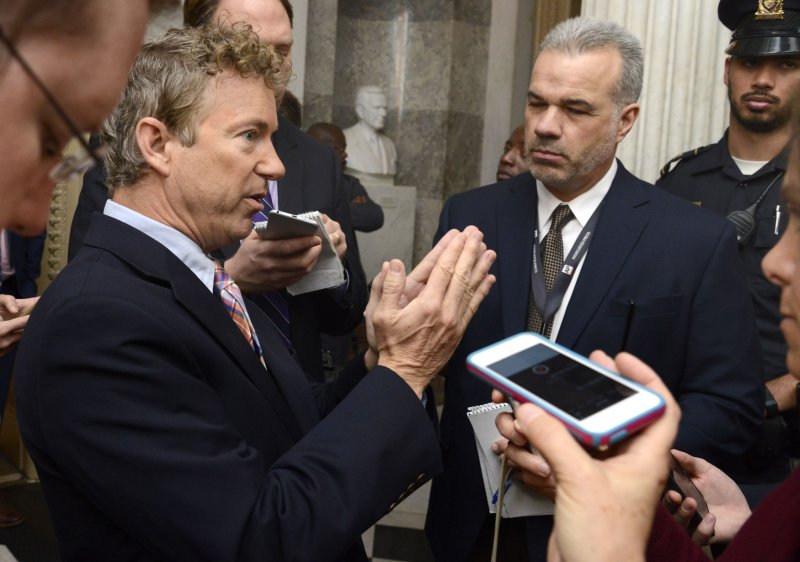"Saudi Arabia is causing a humanitarian crisis with a war in Yemen. It funds extremism worldwide. Abuses human rights. Stop arming them now," Sen. Rand Paul of Kentucky, pictured speaking to the press on April 7, 2017, tweeted Tuesday after voting to stop about $500 million of the $110 billion arms deal U.S. President Donald Trump struck with Saudi Arabia recently. File photo by Mike Theiler/UPI |
License Photo
June 14 (UPI) -- A resolution proposed by Sen. Chris Murphy, D-Conn., and Sen. Rand Paul, R-Ky., to block $510 million in precision-guided weapons as part of a $110 billion Saudi arms sale failed to pass Tuesday.
Much of the opposition stems from Saudi Arabia intervention in Yemen against Iranian backed Houthi rebel, which has killed thousands and has left millions on the brink of starvation.
The Senate voted 47 to 53, narrowly defeating the resolution and preventing it from moving forward.
Republican Senators Mike Lee, Utah, Todd Young, Ind., and Dean Heller, Nev., in addition to Paul, all voted for the resolution.
"Today, a bipartisan group of senators took a stand against the escalating war Saudi Arabia is waging with Yemen," Paul said in a statement. "This is just the beginning, and we will continue to take a stance against waging an undeclared war and fueling an arms race in the Middle East."
"Saudi Arabia is causing a humanitarian crisis with a war in Yemen. It funds extremism worldwide. Abuses human rights. Stop arming them now," Paul tweeted on Tuesday.
"They're [the Saudis] purposely creating a humanitarian crisis inside Yemen to bring the Houthis and Saleh to the negotiating table, and in the process the Saudis are making terrorist groups like al Qaeda and ISIS stronger," Murphy said in a press statement.
Senate Majority Leader Mitch McConnell, R-Ky., and other supporters of the sale say the Saudis need the weapons to help fight ISIS and to act as a counterweight to growing Iranian influence in the region.
"As we know, some have raised the issue of Saudi conduct of that war [in Yemen], but blocking this arms sale will diminish Saudi capability to target with precision." McConnell said. "Part of the training provided to Saudi Arabia will be on subjects such as avoiding civilian casualties."
Sen. Lindsey Graham, R-N.C., said blocking the sale would be a victory for Iran. "If you don't think containing Iran and keeping them from toppling Yemen, Iraq, Syria [and] Lebanon is not in our national interest, you're making a huge mistake," he said.
The current resolution has gained greater support than previous attempts at blocking arms sales. Sen. Chuck Schumer, D-N.Y., announced his support for the resolution this last weekend.
"The human rights and humanitarian concerns have been well documented and are important: of equal concern to me is that the Saudi government continues to aid and abet terrorism via its relationship with Wahhabism and the funding of schools that spread extremist propaganda throughout the world," Schumer said in a statement.
The conflict in Yemen between the internationally recognized government of President Abdrabbuh Mansour Hadi and Iranian-backed Houthi rebels has killed thousands of civilians, and the Saudi-led coalition's blockade of Yemen has left 70 percent of the country in need of humanitarian aid. Saudi air strikes backed by the U.S have been accused by the United Nations of causing widespread civilian casualties.
"The close vote in the Senate shows opposition to arms sales to Saudi Arabia is growing because Americans are increasingly opposed to supporting a war in Yemen which is targeting innocents. Momentum is with no camp," Bruce Riedel, director of the Brookings Intelligence Center and senior fellow in the Center for Middle East Policy, told UPI.
The $110 billion Saudi arms deal, which the Trump administration has called the largest ever, has faced opposition from Senate Democrats and some Republicans. Specific details of many of the individual sales remain unclear.















